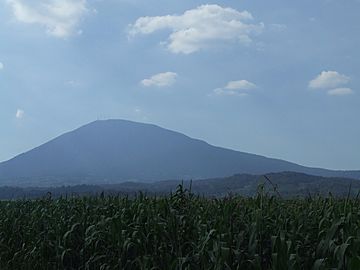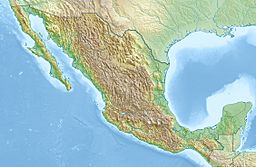Jocotitlán (volcano) facts for kids
Quick facts for kids Jocotitlán |
|
|---|---|
| Xocotépetl | |
 |
|
| Highest point | |
| Elevation | 3,910 m (12,830 ft) |
| Prominence | 1,200 m (3,900 ft) |
| Listing |
|
| Geography | |
| Location | State of Mexico, Mexico |
| Geology | |
| Mountain type | stratovolcano |
| Volcanic arc/belt | Trans-Mexican Volcanic Belt |
| Last eruption | 1180 AD ± 100 years |
| Climbing | |
| Easiest route | hiking trail |
Jocotitlán, also known as Xocotépetl, is a large volcano in the State of Mexico. Its name, Xocotépetl, comes from the Nahuatl language. It means "mountain of the sweet and sour fruits." This amazing volcano stands 3,910 meters (about 12,828 feet) tall. It is the 12th highest mountain peak in all of Mexico.
Contents
Where is Jocotitlán?
Jocotitlán volcano is located in the northern part of the Toluca Valley. It is part of a huge chain of volcanoes. This chain is called the Trans-Mexican Volcanic Belt. This long belt stretches across central Mexico.
The volcano is a type called a stratovolcano. This means it is built up over time. It forms from layers of tephra (volcanic ash and rock) and hardened lava flows. Jocotitlán is also inside a special place. It is part of the Isidro Fabela state park. This park is a protected area of 3,701 hectares. It was created in 1975 to protect the land.
A Sacred Mountain
For a long time, Jocotitlán was seen as a holy place. The Mazahua and Otomi peoples considered it very special. The Mazahua people called it Nguemore, which means "sacred mountain". The Otomi people called it Gumidi. This name means "he who sits facing straight forward".
In ancient times, before Europeans arrived, the volcano had a sanctuary. This was a special place for Otontecuhtli. He was the Otomi king of the gods. The Nahua people also knew him as Xiuhtecuhtli, the fire god. Since the 1980s, a Catholic chapel has also been on the volcano. At 3,670 meters (about 12,041 feet) high, it is one of the highest chapels in Mexico.
Is Jocotitlán Still Active?
Jocotitlán is considered a potentially active volcano. This means it could erupt again someday. It has erupted at least twice in the last 10,000 years. The last known eruption was around 1180 AD.
Just north of Jocotitlán, there are many small cinder cones. These are small, cone-shaped hills. They show that there has been a lot of volcanic activity in this area. If Jocotitlán were to erupt, it could affect nearby cities. This includes Greater Toluca and even Greater Mexico City.
Exploring the Volcano
It is fairly easy to climb Jocotitlán volcano. You can start your climb from the town of Jocotitlán. A winding road, about 19 kilometers (12 miles) long, goes up the mountain. This road leads to a microwave antenna located near the top.
See also
 In Spanish: Xocotépetl para niños
In Spanish: Xocotépetl para niños


